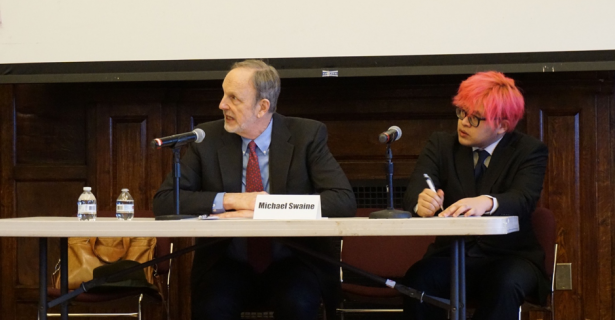Tufts SURGE hosted its 12th Annual China-US Symposium themed “New Frontiers” on April 12 to 13, 2019. As part of the symposium, SURGE invited Dr. Michael Swaine, Senior Fellow at the Carnegie Endowment for International Peace, to deliver the David Rawson Memorial Lecture, sponsored by the Institute for Global Leadership. Dr. Swaine’s lecture was titled, “Power Transitions and Paranoia: The Crisis in Sino-US Security Relations.”
Dr. Swaine warned against adopting a simplistic “zero-sum” narrative on both sides, believing it could lead to unnecessary confrontation, especially at a time where both countries could be cooperating to resolve issues such as terrorism, pandemics, climate change and the non-proliferation of weapons of mass destruction. He nevertheless also pointed out occasions where China should be criticized for being overly aggressive.
In particular, Dr. Swaine pointed out that China’s attitude towards the West is complex. It is not simply the evil world-dominator or West-hater that the media and the Trump administration, in particular, seeks to paint China as. Nor is China, Dr. Swaine points out, trying to upend the international world order, from which it has benefited. Dr. Swaine criticized such depictions as too “nice and easy” and which allow the Trump administration to come up with equally “nice and easy” solutions – an America reinvigorated, secure at home and strong abroad, through offering a “my way or the highway” approach to resolving international issues.
However, Dr. Swaine remarked, "China can't reverse its course from its commitment to the international system. It is integrated into the international economy - and has to continue to deepen that integration." In fact, Dr. Swaine argued that part of the fear stems from the fact that the United States is starting to withdraw from the liberal international world order established at the end of the second World War.
What Dr. Swaine is truly worried about is the lack of institutions and sustained dialogue between the two powers. Dr. Swaine noted that "Beijing and Washington must eventually recognize that neither power will dominate the Asia-Pacific in the future. The near-inevitable balance of power that... is emerging must be made more stable."
Dr. Swaine also warned against providing further opportunities for Moscow and Beijing to coordinate their actions while noting that China and Russia do not automatically move in lockstep. He pointed to limited shared interests and military cooperation between the two Eurasian powers. He believes that NATO’s reckless expansion up to Russia’s borders contributed to Moscow’s hostility, and that overall Russia has limited influence over the global economy. He said that it is a failed state that manages to punch above its weight.
He notes that “in the absence of serious and sustained efforts to moderate the current ugly dynamic that exists between the U.S. and China today, the chances of a significant crisis are arguably increasing." He proposed a series of economic and security frameworks that he thinks are necessary, largely driven from a “realistic set of facts and assumptions about the changing capabilities, actions and intentions of both sides.” These include the cultivation of a single, integrated Asian economic system rather than a set of mutually-exclusive subsystems, an institutionalization and development of a crisis avoidance and management structure, and less escalatory force doctrines.
Dr. Swaine pointed out that while these steps may not necessarily be easy, they are ultimately lacking yet essential in maintaining stability in the Asia-Pacific.
Watch the video of Michael Swaine's address here:

